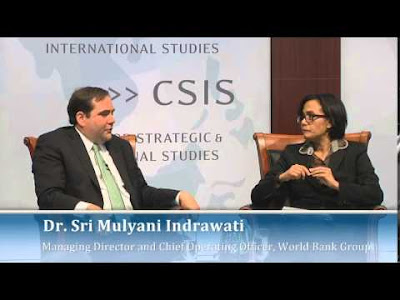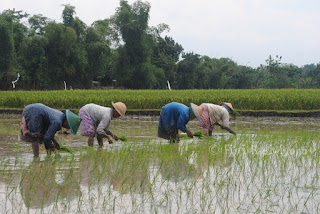Transcript of Global Development Forum 2015 – Closing Keynote by Sri Mulyani
GLOBAL DEVELOPMENT FORUM 2015 – CLOSING KEYNOTE
By Sri Mulyani Indrawati
Transcribed by: Indra Gunawan
Thank you Daniel. Especially for the
very kind introduction, and thank you for participating in our just finished spring
meeting last week, you have a really good supporter for us. And I am really very
honored to be here to participate in your first Global Development Forum 2015. We
all know that CSIS is doing a critical work on security and this [is] very very
good for me to see that you now focus also in economic development because this
is maybe one of the most important key to create a more prosperous and peaceful
world.
Let me share you a little bit about World Bank and what we do. I know that many of you know that, but I will share it especially for this year which is a very critical year. 2015 as you all know is a very important year for development and the World Bank is a multilateral institutional development. You all maybe following the news that international community will define a new Sustainable Development Goal this year which will be the next generation of scorecard for international community effort to end poverty. At the end of this year people also will convene to reach hopefully a climate change deal in Paris, and between these two meetings we are going to have ADIS in July, a meeting to discuss about how they are going to finance the huge need of development globally. So these are all the events which is critical for achieving the 2 goals [which the] World Bank under the leadership of President Jim Kim has stated; first to eliminate the poverty, the extreme poverty by 2030, and second, to ensure that the bottom 40% of every society will benefit from growth, we use it the terms [of] “Shared prosperity”. And this is becoming even more many important issue for many country when they are having a very successful growth rate but inequality and inclusiveness become an issue.
We know that there are quite a lot of progress in the past 15 years, the share of people living under the poverty line, we define USD1.25/day has gone down from 36% to 12% so it is really a huge progress. Nation like Brazil or my own country, Indonesia, now emerge as a middle income country or they call it emerging country, until recently they are still also a very strong engine of growth globally. Even when they talk about the past decade, in fact, the emerging and developing country contributing more share of global growth in the economy. But despite all this achievement, we still have 1 billion extreme poor people, and we are facing the next year or even decade a sluggish growth, a low commodity price and rising conflict. So our job is not going to be easier, it is not yet done, and the work to end poverty need to continue and to promote growth as well as to share opportunity. Most of our client country in the World Bank actually know what how to fix their problem.
They come to us for the resources, some of really lending as one of their motivation, but more and more they come to us is actually for the knowledge and know how; how do I improve the level and quality of growth, how should be design the infrastructure to create the connectivity, how do I build a better education system beyond just accessibility, how can I fight corruption, how can I make sure that when we have to make a reform, painful, we can protect the poor. So money is only part of the solution of many of development question. Expertise, knowledge, and sometimes experience from many different country and definitely good institutions are very critical. And increasing part of our work is actually helping client country to find practical solution to their development challenges. When I was finance minister in Indonesia – Daniel mentioned about that – actually I appreciate the fact that I could go to the World Bank and ask for idea, advice [or] sometimes just asking what is the experience of other country facing with this kind of situation; for example dealing with the state-owned enterprises, dealing with contingent liability when oil price increasing very sharply in a very short time, then I have to deal with the budget situation, have to address the fuel subsidy by reducing it, I ask what is the technique in order for us to be able to implement those painful policy while protecting the poor, the can provide me with the very quick at least experience how Mexico, Brazil, have the [..] [the others] and conditional cash transfer. So these kinds of things in my conversation with many of the finance minister, development minister during the last spring meeting is actually discussing quite a lot about that kind of conversation.
But apart from the development issue,
now we also know that location matters too. Most of the world poor now live in
middle income countries like China and India which have a persistent pocket of
poverty, often in a very remote area. And these two clients, two big client
countries, because you are talking about China with 4 trillion reserve they
still come and discuss with us and borrowing 5 billion to address the issue
which is very challenging for them. We have a discussion about how they are
going to redesign the urbanization which is become the, it was, and has been an
engine of growth in China but how to make it now work better for the poor and
to be more inclusive. Poverty also increasingly concentrated in a country
affected by fragility and conflict and violence. As you all know 1.2 billion
people in the world live in these places and we won’t be able to achieve the
goal of ending poverty by 2030 if we don’t make a significant progress in these
area. So one of the most critical ingredient to ending conflict and this is
what we discuss in many of the conflict area is actually more on an economic
development such how to kick start the economic and creating job. This is where
our private sector arms IFC is so important, because many of the solution is
not always require the government money. A lot is actually at the hand of the
private sector and that’s why our IFC as an instrument, as an institution to
attract the private sector is very critical.
With backing from IFC for example, in
Burundi, we’re making easier for smaller business to access finance. Or in
Timor Leste, we help reduce the time it takes to open the business from
previously 102 days to only now 19 days. The truth is that getting over
finishing line for ending poverty cannot be done solely with traditional
government aid, although government is still important, but they cannot be done
only with that; it takes a private sectors, as well as domestic resource
mobilization that as well as the knowledge and experience of many that we can
avoid what is the unnecessary policy, bad policy and accelerating the growth.
And it takes also international cooperation. Many of the issue that cause
poverty don’t respect border. If we talk about Ebola, or we talk about violent,
weathers and climate change, money laundering, violence, corruption and deadly
displacement through the conflict as we can see in the Mediterranean Sea, none
of these problem can be solved by one single country, so many of this is
becoming global public bad, and that’s why multilateral cooperation is becoming
very critical.
So, more cooperation is more important
or is becoming even more needed not less cooperation. The multilateral system
is making a strong contribution, you all heard about the G7 I am sure and the G20.
We, in the World Bank, we always like to call ourselves the G188, this is a
true multilateral institution and the United States is our biggest shareholder
and our strong partner, and I do hope that there is a biggest shareholder you
play a very important role in shaping this institution but also contributing to
the global development goal development goal of reducing or eradicating poverty
and sharing more prosperity, thank you very much.


Comments
Post a Comment